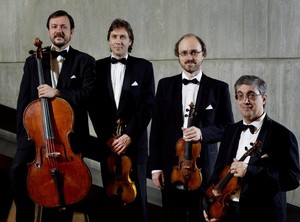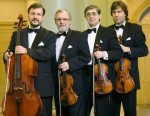The State Borodin QuartetOrchestraThe Borodin Quartet
is a string quartet that was founded in 1945 in the former Soviet Union. It is
one of the world's longest lasting string quartets, marking its 60th anniversary
season in 2005.
The quartet was one of the
Soviet Union's best known in the West during the Cold War era, through concert
performances in the United States and Europe and through distribution of their
recordings.
The quartet had a close
relationship with composer Dmitri Shostakovich, who personally consulted with
them on each of his quartets. They also performed with the pianist Sviatoslav
Richter on many occasions. They have recorded all of Shostakovich's string
quartets as well as all of Beethoven's quartets. Their many recordings include
works by a wide range of composers on the Melodiya, Teldec, Virgin Records,
Chandos Records labels.
The original Borodin
quartet's sound was characterised by an almost symphonic volume and a highly
developed ability to phrase whilst maintaining group cohesion. Although it has
seen many changes in personnel over its life span, all members of the quartet
have been graduates of the Moscow Conservatory.
The quartet was formed as
the Moscow Conservatoire Quartet with Mstislav Rostropovich on cello,
Rostislav Dubinsky and Nina Barshai on first and second violins and Rudolf
Barshai on viola, all members of a class taken by Mikhail Terian, the viola
player of the Comitas Quartet. Originally Mstislav Rostropovich was the cellist
but he withdrew after a few weeks in favour of Berlinsky.
The quartet first met
Dmitri Shostakovich in 1946 and became an interpreter of his compositions. In
due course they became known for their performances of all the quartets in the
Shostakovich quartet canon (eventually numbering 15 quartets) at concert halls
around the world.
As one of the most revered
groups during the Communist era, the quartet performed at the funerals of both
Joseph Stalin and Sergei Prokofiev, who both died on the same day in 1953.
In 1955 the quartet was
renamed after Alexander Borodin, one of the founders of Russian chamber
music.
In the Soviet era their
concert engagements and repertoire were directed by the state concert
organisation, Gosconcert on the basis of maximum revenue. This was irksome to
the performers and to Western concert organisers.
After 20 years with the
same line-up, difficult times followed in the 1970s: Dubinsky defected to the
West, and the second violinist, Yaroslav Alexandrov, retired due to ill-health.
Having recruited replacements, Berlinsky insisted that the ensemble spend two
years out of public attention until the Borodin sound had been fully
recreated.
In his 1989 book,
Stormy Applause, Dubinsky suggested disharmony, power struggles and
betrayal to the authorities by Berlinsky, who admitted being a Communist Party
member. Berlinsky, for his part, dismissed the book as being “full of half
truths”. Whatever the truth of such stories, Berlinsky's record of serving for
62 years in one of the world's most renowned string quartets was a singular
achievement, possibly unique in the history of the genre.
The Borodin Quartet
is a string quartet that was founded in 1945 in the former Soviet Union. It is
one of the world's longest lasting string quartets, marking its 60th anniversary
season in 2005.
The quartet was one of the
Soviet Union's best known in the West during the Cold War era, through concert
performances in the United States and Europe and through distribution of their
recordings.
The quartet had a close
relationship with composer Dmitri Shostakovich, who personally consulted with
them on each of his quartets. They also performed with the pianist Sviatoslav
Richter on many occasions. They have recorded all of Shostakovich's string
quartets as well as all of Beethoven's quartets. Their many recordings include
works by a wide range of composers on the Melodiya, Teldec, Virgin Records,
Chandos Records labels.
The original Borodin
quartet's sound was characterised by an almost symphonic volume and a highly
developed ability to phrase whilst maintaining group cohesion. Although it has
seen many changes in personnel over its life span, all members of the quartet
have been graduates of the Moscow Conservatory.
The quartet was formed as
the Moscow Conservatoire Quartet with Mstislav Rostropovich on cello,
Rostislav Dubinsky and Nina Barshai on first and second violins and Rudolf
Barshai on viola, all members of a class taken by Mikhail Terian, the viola
player of the Comitas Quartet. Originally Mstislav Rostropovich was the cellist
but he withdrew after a few weeks in favour of Berlinsky.
The quartet first met
Dmitri Shostakovich in 1946 and became an interpreter of his compositions. In
due course they became known for their performances of all the quartets in the
Shostakovich quartet canon (eventually numbering 15 quartets) at concert halls
around the world.
As one of the most revered
groups during the Communist era, the quartet performed at the funerals of both
Joseph Stalin and Sergei Prokofiev, who both died on the same day in 1953.
In 1955 the quartet was
renamed after Alexander Borodin, one of the founders of Russian chamber
music.
In the Soviet era their
concert engagements and repertoire were directed by the state concert
organisation, Gosconcert on the basis of maximum revenue. This was irksome to
the performers and to Western concert organisers.
After 20 years with the
same line-up, difficult times followed in the 1970s: Dubinsky defected to the
West, and the second violinist, Yaroslav Alexandrov, retired due to ill-health.
Having recruited replacements, Berlinsky insisted that the ensemble spend two
years out of public attention until the Borodin sound had been fully
recreated.
In his 1989 book,
Stormy Applause, Dubinsky suggested disharmony, power struggles and
betrayal to the authorities by Berlinsky, who admitted being a Communist Party
member. Berlinsky, for his part, dismissed the book as being “full of half
truths”. Whatever the truth of such stories, Berlinsky's record of serving for
62 years in one of the world's most renowned string quartets was a singular
achievement, possibly unique in the history of the genre.
|  Mariinsky Theatre:
Mariinsky Theatre:  Mariinsky-2 (New Theatre):
Mariinsky-2 (New Theatre):  Mariinsky Concert Hall:
Mariinsky Concert Hall: 


